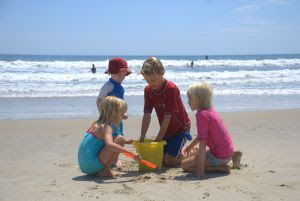Late Motherhood: They Did it, Can You?

There is no stopping the biological clock, as the birth rate shows. In 1999, there were 622,000 babies born in England and Wales. The most productive group, surprisingly, was the women aged 30-34: they had 185,300 babies. By the time women reached 40-44, they produced 13,600 specimens, and at 45-plus, 635 gave birth. In fact, nearly 300,000 women over 30 had babies, a cheering thought, until you think of the nappies.
But the figures leave much in the dark. How many 40-plus women are still trying, how many are still using contraceptives, how many are already infertile? Looking back can cast some light. In 1938, the number of women having babies in the 30-34 age group was actually smaller than today, even though the birth rate was roughly the same. Madonna and Cherie wouldn't have even made a paragraph then, when 25,000 women in the 40-44 age group gave birth - almost double current levels - and 2,200 babies were born to women over 45. That's almost four times as many as now. Clearly, choice, as well as biology, plays an important part - the really sharp decline in the birth rate for 35-plus women came in the 1970s, when it halved, coinciding with easier access to the Pill and abortion.
So, by when should you have your fertility tested? Unfortunately, exactly at what rate fertility declines is impossible to say. Nobody has measured the number of women trying to get pregnant at 40, say, and studied how successful they are. To state, as one Sunday broadsheet report of the American campaign did, that the rate of conception drops to a mere 2 per cent at 40 is very bleak and misleading.
No one can deny that you may have to wait longer to get pregnant once you are in you mid- to late-thirties, or that you may fail. As someone who did have a baby at the drop of a hat at 40, and another, albeit after three miscarriages, at 46, my advice is this: next time you see a shock-horror headline about older mothers, just turn the page.
Photo credit: hortongrou
Some rights reserved
TODAY'S BOOK SUGGESTION:

by Nicky Wesson
-- outlines ways in which you can improve your fertility through alternative therapies, diet, exercise, and relaxation techniques and avoid some of the hazards associated with conventional treatments.
It discusses the most common causes of infertility and explains how to determine which therapy is most appropriate for you.
In vitro fertilization, conventional medicine's most prescribed remedy for infertility problems, is expensive, dangerous, and has a success rate of only 14 percent, yet few of the one in six couples that experience infertility are aware of the effectiveness and safety provided by the wide range of alternative treatments.
Thoroughly researched and packed full of invaluable advice and tips, the book explores such therapies as acupuncture, reflexology, homeopathy, cranial osteopathy, aromatherapy, and herbal-ism.
The author includes case histories for each of the therapies discussed, showing how the therapies helped couples overcome both primary and secondary infertility in order to have the baby they longed for.
Click to order/for more info: Enhancing Fertility Naturally
Category: biological clock, Fertility, Old Eggs, Too Old










0 comments